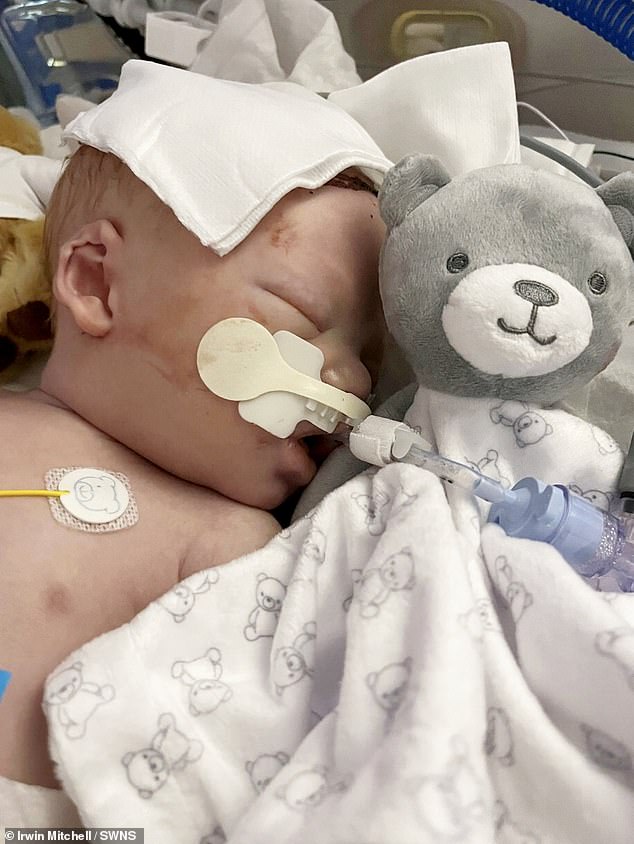A baby died after being deprived of oxygen during labour as midwives joked about how much sweets they had eaten and how much money they had made, an inquest has heard.
Theo Bradley had to be resuscitated following delays in his care at King’s Mill Hospital in Sutton-in-Ashfield, Nottingham, in September last year.
Amelia Bradley, a 26-year-old mother, said she called for help in pain several times but heard maternity staff chatting, including one who said: “I can’t believe how many Haribo sweets I’ve eaten tonight.”
Numerous midwives were sitting around the desk when Ms Bradley should have been assessed within 15 minutes of arriving at the hospital, but this did not happen until 40 minutes later, it was claimed.
An obstetrician at the Trust told the coroner that if Mrs Bradley had been treated quickly, it was highly likely Theo would have survived.
Theo Bradley (pictured) had to be resuscitated due to delays in his care at King’s Mill Hospital in Sutton-in-Ashfield, Nottingham, in September last year.
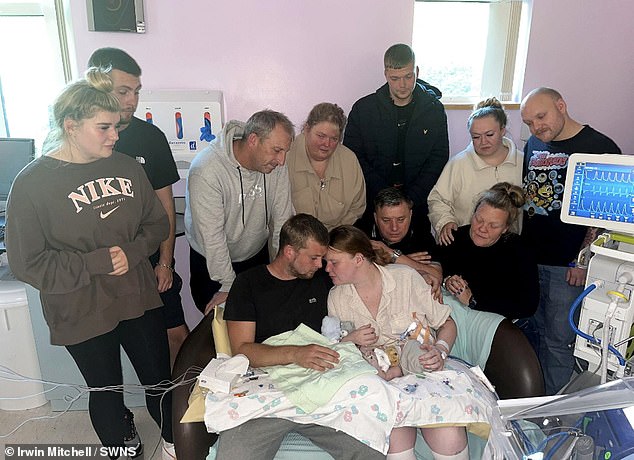
Grieving parents Amelia Bradley, 26, and her partner Luke Sherwood, 26 (pictured centre) are now calling for lessons to be learned following the tragedy.
When she realised she had not been assisted, a midwife admitted to making a comment about a colleague who earned more money than her.
Theo was found to have a slow heart rate and the decision was made to perform a category one caesarean section, when there is an immediate threat to the life of the mother or baby.
After his birth, resuscitation equipment was found to be missing from the unit and Theo was transferred to a specialist neonatal unit for treatment.
However, his condition continued to deteriorate and he died the next day in the arms of his parents and surrounded by his family.
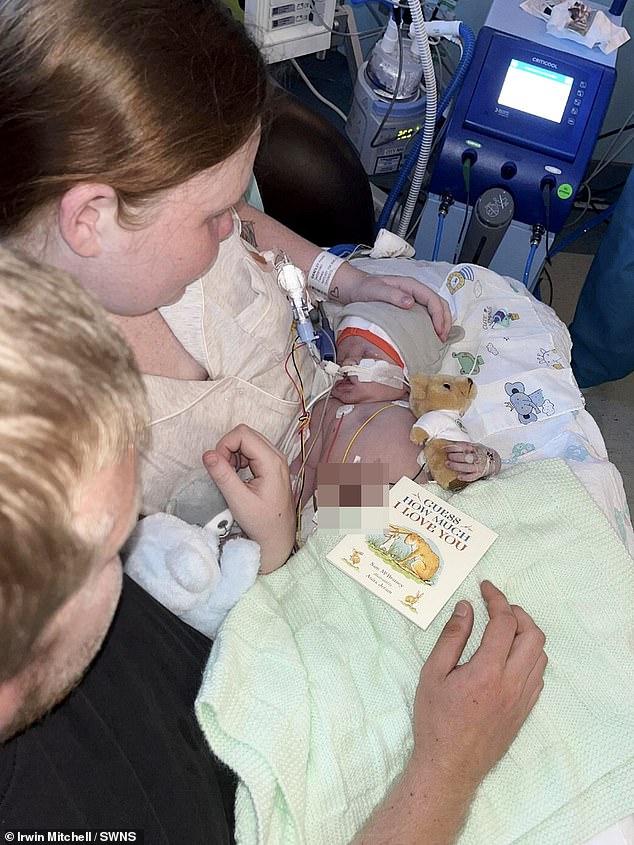
Theo was found to have a slow heart rate and the decision was made to perform a category one caesarean section, when there is an immediate threat to the life of the mother or baby.
An autopsy determined that he died after suffering a severe brain injury caused by a lack of oxygen.
An inquest at Nottingham Coroner’s Court came to a narrative conclusion this week.
Nottinghamshire coroner Elizabeth Didcock found that negligence contributed to Theo’s death.
He discovered that if Theo had been born earlier, he would generally have survived.
Grieving parents Mrs Bradley and her partner Luke Sherwood, 26, of Kirkby-in-Ashfield, Nottingham, are now calling for lessons to be learned following the tragedy.
Ms Bradley, who has applied to start studying midwifery from September, said: ‘Following Theo’s death, Luke and I talked about how we didn’t want another family to have to go through what we’re going through.
‘I want to honour Theo’s name and use this terrible experience to advocate for women and help provide the best care and support that women should expect to receive.
Losing Theo so soon after coming into the world is something we will never get over.
‘We were looking forward to starting a family and to have that taken away from us in such a cruel way was nothing short of traumatic.
“To this day, I still wake up and hope it was all a nightmare and then it hits me and I’m completely devastated with grief.
‘Knowing that our baby will never even celebrate his first birthday is very difficult to accept.
‘Hearing it all over again in the investigation has been excruciating, but we’re grateful to have some answers now.
We would do anything to bring Theo back, but we know it’s not possible.
“All we can hope for now is that no other family has to go through the suffering we have endured. I wouldn’t wish that on anyone.”
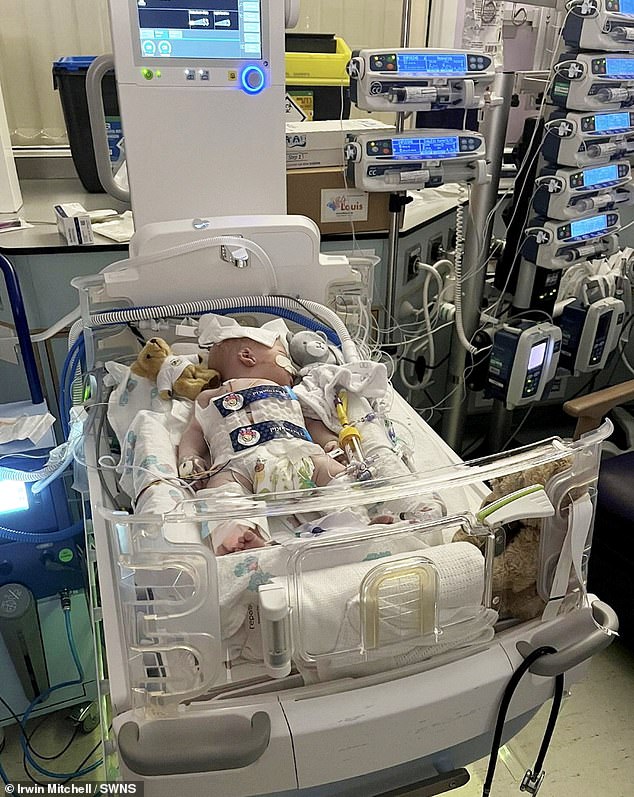
An autopsy determined that she died after suffering severe brain injury caused by lack of oxygen. An inquest at Nottingham Coroner’s Court reached a narrative conclusion this week
Ms Bradley and Mr Ashfield attended King’s Mill Hospital at around 9.30pm on September 13 last year after contractions began.
But the parents waited more than an hour to be seen before Ms Bradley was given painkillers and subjected to a sweep and allowed to return home at around 11.30pm.
Shortly after midnight she began to bleed and feel excruciating pain.
They returned to the hospital and finally assessed her at 1.42am before Theo was born at 2.02am.
A report by the Health Safety Investigation Branch (HSIB) found there was no designated leader in the maternity triage department, leaving no one responsible for allocating roles and managing workload.
None of the triage midwives present took responsibility for who would see Ms Bradley on her return to hospital, resulting in unnecessary delays.
Testimony given by a Trust obstetrician at the inquest indicated that Ms Bradley’s symptoms should have prompted immediate assessment.
The 29-minute delay in Theo receiving resuscitation drugs and blood products may also have affected Theo’s outcome, the report added.
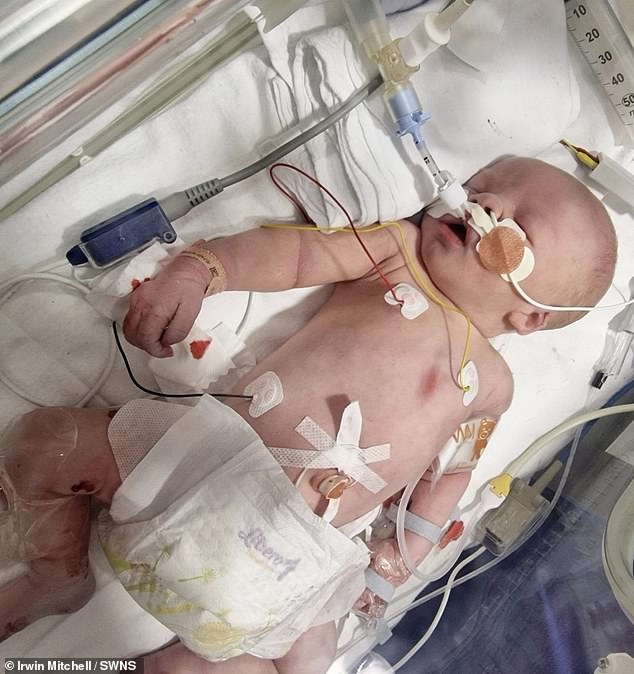
Testimony given by a Trust obstetrician at the inquest indicated that Ms Bradley’s symptoms should have prompted immediate assessment.
An obstetrician at the Trust told the coroner that if an assessment had been carried out quickly, Theo would most likely have survived.
Laura Robinson, a medical negligence lawyer at Irwin Mitchell who is representing the family, said after the hearing: ‘It’s less than a year since Theo died, and losing him so suddenly and in such traumatic circumstances continues to have a profound effect on Amelia and Luke.
‘The pain and grief they feel has been compounded by questions they have about the events that unfolded in the lead up to their baby’s death.
‘While nothing can ever make up for what Amelia and Luke are going through, we’re glad we’ve at least been able to give them some of the answers they deserve.
‘Sadly, however, the investigation has identified problems in the care prior to Theo’s death, particularly in relation to communication, maternity staff training and staff culture.
‘Every second counts when it comes to delivering a baby in distress. It is now vital that lessons are learned to help improve maternity safety and prevent other mums and dads from suffering like Amelia and Luke.
“We will continue to support them in this difficult time.”

